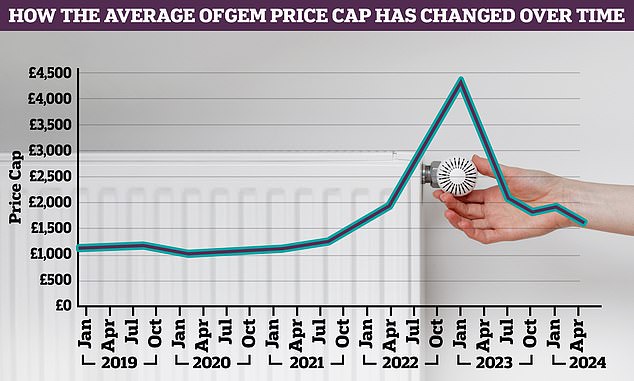Table of Contents
Households woke up today to the announcement that the average energy bill would fall by £238 to £1,690 from April, but these high prices have left many wondering if they can get a better deal by switching.
Energy regulator Ofgem said today that the current bill with a capped average price of £1,928 a year would fall by 12.3 per cent on April 1.
The price cap sets the energy bills paid by more than 80 per cent of UK households, although the exact amount varies depending on gas and electricity usage.
But even the next energy bill price cut will leave millions of households paying very expensive energy bills and eager to get a cheaper deal.

Price cap falls: Ofgem says that from April the price cap will fall by 12.3%
Today, households have a choice on their energy bills.
They can stay on a price-capped, variable-rate tariff that they were likely lumped into amid the energy crisis and that won’t vary much in price between suppliers, or they can sign a fixed-rate agreement with a new or existing supplier.
But is switching energy deals worth it and will it save you money?
When is it right to change?
To know whether switching energy deals is better than staying in a price-cap deal, the first thing to do is look at what energy prices are likely to affect.
This is because the only realistic way to save money on a capped rate is to go with a fixed rate.
These were the main type of energy agreement before 2021, when gas and electricity prices began to skyrocket and companies responded by withdrawing all their new fixed rate agreements.
The arrangements work by fixing the price consumers pay for their ongoing charge and the gas and electricity they use, often for one or more years.
Obviously, someone taking out a fixed rate deal to save money has to bet that the deal will work out cheaper than sticking with a variable rate deal, where prices will vary.
This is difficult to predict.
However, expert analysts at Cornwall Insight believe the average gas and electricity bill will fall again to £1,465.07 in July, before rising to £1,523.95 in October.
Each price reset lasts three months, meaning typical energy bills will likely range between £1,400 and £1,500 throughout the year.
How do I know if an energy deal is good?
To determine whether an energy deal (fixed or not) is cheaper than what you pay now, compare the unit rate and standing charge with what you currently pay.
Where are all the cheap fixed rate deals?
According to Cornwall Insight, there are currently 35 fixed rate energy deals on the open market.
However, most find it no cheaper than staying on a capped rate starting April 1.
There are some energy companies that promise to exceed the price limit until July.
Earlier this month, British Gas launched its Price Promise tariff, which costs £1,699 a year for the average dual-fuel home until April.
The appeal of the deal is that it also promises to beat the price cap from April, although British Gas has not given further details.
But many companies offer secret fixed rates to their own clients and do not have to make the details of these public.
Some of these may be cheaper than staying on a variable rate; Again, the only way to know is to compare unit rates and standing charges.
Things to keep in mind with fixed rate offers
Many fixed-rate energy deals come with high exit fees, which you will pay if you try to leave the deal early.
These can reach £150 each for gas and electricity.
Will there be more cheap fixed rate energy offers in the future?
It is very possible.
Wholesale energy prices are falling, which could lead energy companies to start offering cheaper deals to customers.
Richard Neudegg, head of regulation at Uswitch, said: ‘We are seeing some green shoots of deals returning to the energy market, with suppliers making regular changes to their tariffs and slowly lowering prices.
“Lower wholesale costs are helping give suppliers more room to offer deals.”
Additionally, consumers may soon see more cheap energy deals because regulator Ofgem is scrapping rules that deliberately prevented such tariffs from being launched.
The rules called Market Stabilization Charge (MSC) were introduced in April 2022 and will expire on March 31, 2024.
The MSC is an order from Ofgem for energy suppliers to compensate their rivals if customers switch to them, provided wholesale prices fall 10 per cent below the assumptions used to set the maximum price at that time.
In practice, the MSC means that no energy company is likely to strike deals that seriously weaken their rivals, as this would mean they could lose money by having to compensate their opponents if wholesale prices fall again.
The objective of the MSC was to curb competition from energy companies and prevent one company from acquiring too many customers and causing others to go bankrupt.
But the MSC ending on April 1 should mean that energy companies have more reason to launch better deals than their rivals, without fear of having to pay them any compensation.
However, Ofgem has today announced that another of its policies that underpin current high energy bills will be extended for up to a further 12 months.
The briefly titled Ban on Takeover Tariffs (BAT) means that energy companies cannot offer cheaper deals to new customers unless they also offer them to existing customers.
The BAT’s goal is to prevent energy companies from aggressively undercutting each other with new deals, as any such price reduction offer would have to be made to all customers.
But the obvious problem with the BAT is that it prevents energy companies from submitting better offers.
Like the MSC, Ofgem introduced the BAT in April 2022 to prevent one energy company from drastically undercutting its rivals at a time of great upheaval for energy companies.
Ofgem said it wanted to keep BAT for now so as not to “remove both safeguards at the same time”.
James Mabey, analyst at Cornwall Insight, said: “While the expiry of the MSC is likely to be on providers’ minds, and the number of sub-cap solutions on the market is likely to increase once the mechanism is gone , as its absence will mean reduced financial risk in offering competitively priced tariffs during a period when wholesale prices are falling: it is the recent falls in wholesale prices and subsequent forecasts of lower limits that are mainly driving the number and price of solutions currently on the market.
Simon Oscroft, co-founder of So Energy, said: “Ofgem’s decision today is another kick in the teeth for energy customers after a painful few years.
‘When the BAT is removed, suppliers will be free to hide their best deals from their loyal customers.
‘Why shouldn’t they have access to the best deals? Loyal customers shouldn’t have to call their provider at renewal time and haggle for a deal they can see the provider offering elsewhere.’
Some links in this article may be affiliate links. If you click on them, we may earn a small commission. That helps us fund This Is Money and keep it free to use. We do not write articles to promote products. We do not allow any commercial relationship to affect our editorial independence.


